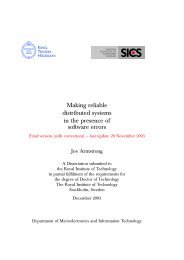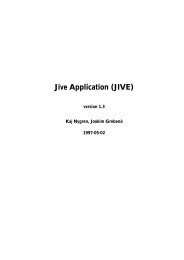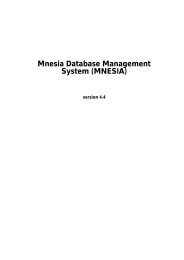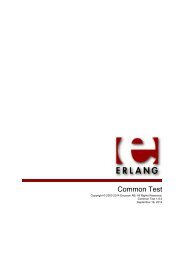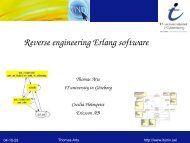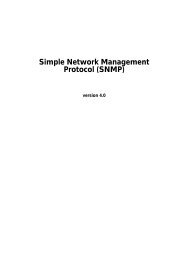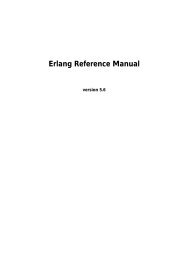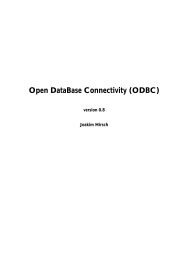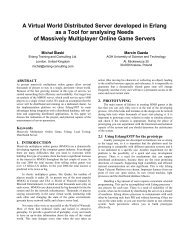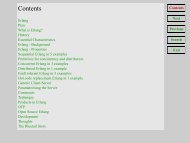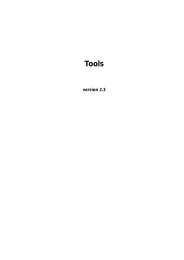Erlang Run-Time System Application (ERTS)
Erlang Run-Time System Application (ERTS)
Erlang Run-Time System Application (ERTS)
- No tags were found...
You also want an ePaper? Increase the reach of your titles
YUMPU automatically turns print PDFs into web optimized ePapers that Google loves.
erl (Command)<strong>ERTS</strong> Reference Manual-compile mod1 mod2 .... Makes the <strong>Erlang</strong> system compile mod1.erl mod2.erl ....and then terminate (with non-zero exit code if the compilation of some file didn’tsucceed). Implies -noinput.-config Config Reads the Config.config configuration file in order to configure thesystem. See application(3).-cookie This flag from release 4.3 is now obsolete. The default of an <strong>Erlang</strong> system is toread the $HOME/.erlang.cookie file when started and to set the node cookie tothe contents of the user’s cookie file. If no such file is found, the system will createone and it will be filled with a random string. See -setcookie.-env Variable Value Sets the HOST OS environment variable Variable to the valueValue of the <strong>Erlang</strong> system. For example:% erl -env DISPLAY gin:0In this example, an <strong>Erlang</strong> system is started with the DISPLAY environmentvariable set to the value gin:0.-heart Starts heart beat monitoring of the <strong>Erlang</strong> system. See heart(3).-hosts Hosts Specifies the IP addresses for the hosts on which an <strong>Erlang</strong> boot servers arerunning. This flag is mandatory if the -loader inet flag is present. On each host,there must be one <strong>Erlang</strong> node running, on which the boot server must bestarted.The IP addresses must be given in the standard form (four decimal numbersseparated by periods, for example “150.236.20.74”). Hosts names are notacceptable, but an broadcast address (preferably limited to the local network) is.-id Id Specifies the identity of the <strong>Erlang</strong> system. If the system runs as a distributednode, Id must be identical to the name supplied together with the -sname or-name distribution flags.-instr Selects an instrumented <strong>Erlang</strong> system (virtual machine) to run, instead of theordinary one. When running an instrumented system, some resource usage datacan be obtained and analysed using the module instrument. Functionally, itbehaves exactly like an ordinary <strong>Erlang</strong> system.-loader Loader Specifies the name of the loader used to load <strong>Erlang</strong> modules into thesystem. See erl prim loader(3). Loader can be efile (use the local file system), orinet (load using the boot server on another <strong>Erlang</strong> node). If Loader is somethingelse, the user supplied Loader port program is started.If the -loader flag is omitted efile is assumed.-make Makes the <strong>Erlang</strong> system invoke make:all() in the current work directory andthen terminate. See make(3). Implies -noinput.-man Module Displays the manual page for the <strong>Erlang</strong> module Module.-mode Mode The mode flag indicates if the system will load code automatically atruntime, or if all code is loaded during system initialization. Mode can be eitherinteractive to allow automatic code loading, or embedded to load all code duringstart-up. See code(3).-name Name Makes the node a distributed node. This flag invokes all network serversnecessary for a node to become distributed. See net kernel(3).The name of the node will be Name@Host, where Host is the fully qualified hostname of the current host. This option also ensures that epmd runs on the currenthost before <strong>Erlang</strong> is started. See epmd(1).10 <strong>Erlang</strong> <strong>Run</strong>-<strong>Time</strong> <strong>System</strong> <strong>Application</strong> (<strong>ERTS</strong>)



